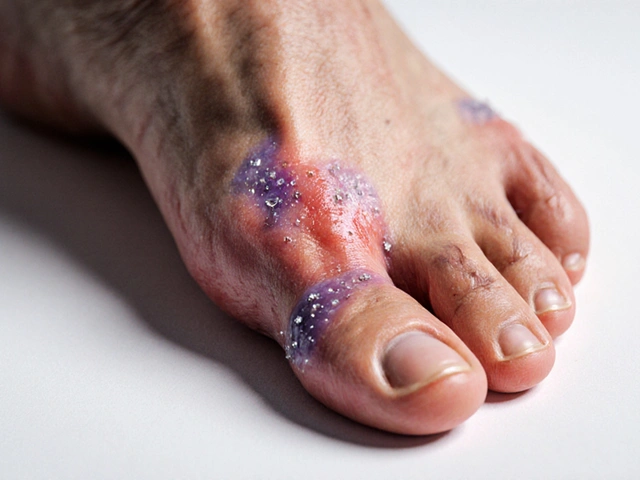Clenbuterol Anxiety Risk Assessment Tool
Assess Your Anxiety Risk
Answer these questions to determine your current risk level and get personalized recommendations.
Clenbuterol Anxiety Management Checklist
Track your progress with these evidence-based strategies from the article:
- Start with the lowest effective clenbuterol dose. ✓
- Avoid coffee or other stimulants after lunch. ✓
- Take 300-400 mg magnesium before bed. ✓
- Schedule 30 minutes of moderate cardio daily. ✓
- Practice 5-minute box breathing each morning. ✓
- Log sleep quality and anxiety level in a journal. ✓
- Reach out to a therapist if anxiety persists >7 days. ✓
Ever felt your heart race after a clenbuterol cycle and wondered if the jitters are more than just a physical reaction? You’re not alone-many users report a spike in anxiety that can feel overwhelming. This guide breaks down why clenbuterol can mess with your mood and gives you a toolbox of proven strategies to keep your mental health in check.
What is Clenbuterol?
Clenbuterol is a synthetic beta-2 agonist originally developed as a bronchodilator for asthma patients. Though not approved for human use in the United States, it’s popular in bodybuilding circles for its ability to boost metabolism and promote fat loss. The drug works by stimulating beta-2 receptors, which ramps up the body's core temperature and accelerates calorie burning.
How Clenbuterol Triggers Anxiety
When you take a Beta-2 agonist, your sympathetic nervous system gets a jolt. This leads to higher levels of adrenaline and noradrenaline-chemicals that naturally increase heart rate, blood pressure, and alertness. In excess, they can tip the balance toward panic, racing thoughts, and muscle tension.
Another piece of the puzzle is cortisol. Clenbuterol’s thermogenic effect forces the adrenal glands to release more cortisol to manage stress, and chronic elevation of cortisol is a known risk factor for anxiety disorders. Finally, the drug can interfere with neurotransmitters like GABA that normally calm the brain, making it harder to achieve a relaxed state.
Recognizing the Signs of Anxiety
Being able to spot anxiety early helps you intervene before it spirals. Look for these common symptoms that often appear during a clenbuterol cycle:
- Persistent worry or feeling “on edge” for no obvious reason
- Shortness of breath, heart palpitations, or chest tightness
- Restlessness, inability to sit still, or frequent fidgeting
- Insomnia or fragmented sleep patterns
- Muscle tension, especially in the neck and shoulders
If you notice two or more of these signs lasting more than a week, it’s time to take action.
Practical Ways to Manage Anxiety While Using Clenbuterol
There’s no one‑size‑fits‑all solution, but combining lifestyle tweaks, nutritional support, and, when needed, professional help can dramatically lower anxiety levels.
1. Optimize Your Dose Schedule
Start with the lowest effective dose and avoid stacking with other stimulants (like caffeine or ephedrine). Some users find that splitting the daily dose into smaller portions reduces the peak‑sympathetic surge.
2. Prioritize Sleep Hygiene
Good sleep is the single most powerful antidote to anxiety. Implement these habits:
- Keep the bedroom cool (around 65°F/18°C) and dark.
- Limit blue‑light exposure at least an hour before bed.
- Establish a consistent bedtime routine-reading, gentle stretching, or a warm shower.
3. Use Targeted Supplements
The right nutrients can blunt the nervous system’s over‑reaction:
- Magnesium (300‑400 mg nightly) helps regulate neurotransmitter release and relax muscles.
- Vitamin B‑complex supports energy metabolism without overstimulating the nervous system.
- Adaptogenic herbs like ashwagandha (300 mg of a high‑extract) have been shown to lower cortisol levels.
4. Incorporate Regular Aerobic Exercise
Moderate cardio (30‑45 minutes, 4‑5 times/week) boosts endorphins and improves heart‑rate variability-a metric linked to anxiety resilience. Avoid high‑intensity interval training on days you feel most jittery; steady‑state activities are gentler on the nervous system.
5. Practice Mind‑Body Techniques
Mindful breathing, progressive muscle relaxation, and short meditation sessions (5‑10 minutes) calm the sympathetic response. Apps like Insight Timer or simple box‑breathing can be done anywhere, even during a break at the gym.
6. Consider Professional Support
If anxiety interferes with work, relationships, or daily function, seeking help is a smart move. Cognitive behavioral therapy (Cognitive behavioral therapy (CBT)) is the gold‑standard for anxiety disorders and can be combined with medication when necessary.
When medication is recommended, doctors often start with a selective serotonin reuptake inhibitor (Selective serotonin reuptake inhibitor (SSRI)) such as sertraline. It’s crucial to discuss any current supplement or stimulant use with your prescriber to avoid drug interactions.
Quick Management Checklist
Keep this list on your phone or fridge. Tick each item when you complete it.
- ✓ Start with the lowest effective clenbuterol dose.
- ✓ Avoid coffee or other stimulants after lunch.
- ✓ Take 300‑400 mg magnesium before bed.
- ✓ Schedule 30 minutes of moderate cardio daily.
- ✓ Practice 5‑minute box breathing each morning.
- ✓ Log sleep quality and anxiety level in a journal.
- ✓ Reach out to a therapist if anxiety persists >7 days.

Frequently Asked Questions
Can clenbuterol cause long‑term anxiety?
Short‑term cycles usually cause temporary anxiety that resolves after the drug clears (about 48 hours). However, repeated cycles can sensitize the sympathetic system, making future anxiety episodes more likely. Monitoring and taking breaks between cycles helps prevent chronic issues.
Is it safe to combine clenbuterol with a SSRI?
Generally safe when supervised by a physician, but both can affect heart rate. Your doctor should monitor ECG and adjust dosages if needed.
What’s the best time of day to take clenbuterol?
Most users split the dose into two administrations: early morning and early afternoon. This avoids a late‑night stimulant effect that can sabotage sleep.
Can natural supplements replace prescription anxiety meds?
For mild, situational anxiety, magnesium, ashwagandha, and proper sleep can be enough. Severe or persistent anxiety often requires a prescription SSRI or therapy for lasting relief.
How long does it take for anxiety symptoms to fade after stopping clenbuterol?
Most users notice a drop in anxiety within 24‑48 hours as the drug’s half‑life clears. Full normalization of cortisol and neurotransmitter balance may take up to two weeks, especially if you had high‑dose cycles.
Next Steps
Start by journaling your current anxiety level and sleep quality. Then choose three items from the checklist to implement this week. If you don’t see improvement after ten days, schedule a telehealth visit to discuss possible medication or therapy options. Remember, protecting your mental health is as important as any physique goal.








12 Comments
Stephanie Zaragoza October 18, 2025
Clenbuterol’s sympathomimetic activity, while effective for thermogenesis, undeniably elevates catecholamine levels, which precipitates anxiety in susceptible individuals; therefore, a titrated dosing regimen, accompanied by vigilant monitoring of heart rate and perceived stress, is essential. Furthermore, integrating magnesium supplementation and structured sleep hygiene can mitigate the neuroendocrine cascade that otherwise fuels panic.
Janet Morales October 30, 2025
If you think a tiny puff of adrenaline is harmless, you’re living in a fantasy-your brain will hijack every nerve ending!
Rajesh Singh November 10, 2025
Clenbuterol, a synthetic beta‑2 agonist, masquerades as a miracle fat‑burner while subtly rewiring the body’s stress circuitry.
Its pharmacologic profile unleashes a torrent of epinephrine, nudging the sympathetic nervous system into overdrive.
Many novices mistake the resulting tachycardia for mere cardio‑boost, overlooking the psychological tremors that follow.
The surge in cortisol, a downstream effect of sustained thermogenesis, erodes the buffering capacity of the prefrontal cortex.
When the prefrontal cortex falters, irrational thoughts proliferate, and the individual spirals into a state of perpetual alarm.
Moreover, chronic exposure dampens GABAergic inhibition, stripping away the brain’s natural calming mechanisms.
The consequence is a cascade: insomnia begets irritability, irritability fuels anxiety, and anxiety amplifies perceived physical discomfort.
A user who neglects to split doses may experience peak plasma concentrations that feel akin to a heart attack, psychologically and physiologically.
Such peaks are not merely uncomfortable; they constitute a moral hazard, encouraging reckless self‑medication.
From an ethical standpoint, promoting a substance that destabilizes mental health without medical supervision is indefensible.
The responsible path involves meticulous dose titration, beginning with the lowest effective microgram and never exceeding recommended cycles.
Supplemental magnesium restores neuronal excitability thresholds, while ashwagandha tempers cortisol spikes.
Incorporating low‑impact aerobic activity, such as brisk walking, re‑establishes heart‑rate variability and signals the nervous system to relax.
Mind‑body practices, especially box breathing, serve as a reset button for sympathetic overactivation.
If anxiety persists beyond a week, seeking professional help is not a sign of weakness but an acknowledgment of the drug’s potency.
Ultimately, one must weigh aesthetic ambition against the sanctity of mental equilibrium; the latter should never be compromised for fleeting gains.
Albert Fernàndez Chacón November 22, 2025
From a physiological standpoint, the beta‑2 receptor agonism spikes adrenaline, which downstream triggers the hypothalamic‑pituitary‑adrenal axis, resulting in heightened cortisol and anxiety; thus, a balanced approach with dose cycling and recovery periods is crucial.
Drew Waggoner December 4, 2025
Skipping the cooldown after a clenbuterol push only guarantees the nervous system stays on high alert.
Mike Hamilton December 15, 2025
I think its important to remember that everybodys brain chemistry reacts differentlly, so what works for one may not for anothers.
Matthew Miller December 27, 2025
Crush those jitters by powering up your magnesium, dialing down caffeine, and slamming a 10‑minute breathing drill before every workout-your mind will thank you!
Liberty Moneybomb January 7, 2026
They don't want you to know that Big Pharma is secretly funding clenbuterol research to keep us dependent on their anxiety meds, while they push this ‘quick‑fix’ as a miracle.
Alex Lineses January 19, 2026
Regardless of the noise, focusing on proven steps-sleep hygiene, magnesium intake, and regular cardio-remains the safest strategy for managing side effects.
Brian Van Horne January 31, 2026
The evidence suggests that a split dosing schedule reduces peak sympathetic activation.
Norman Adams February 11, 2026
Oh sure, because nothing says 'professional' like self‑administering a bronchodilator and hoping the anxiety just disappears on its own.
Margaret pope February 23, 2026
You’ve got this just keep tracking your sleep and take magnesium at night you’ll feel better